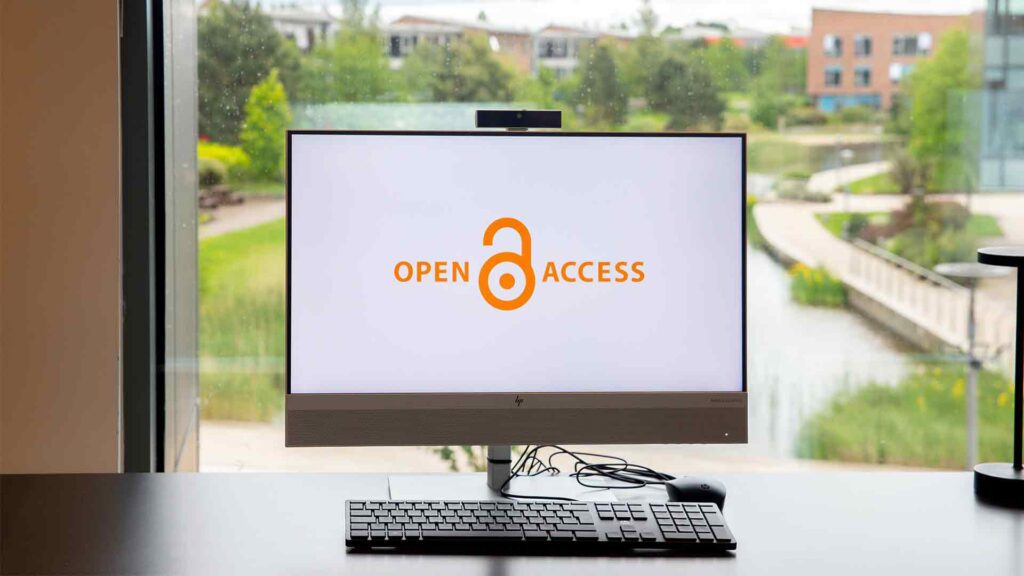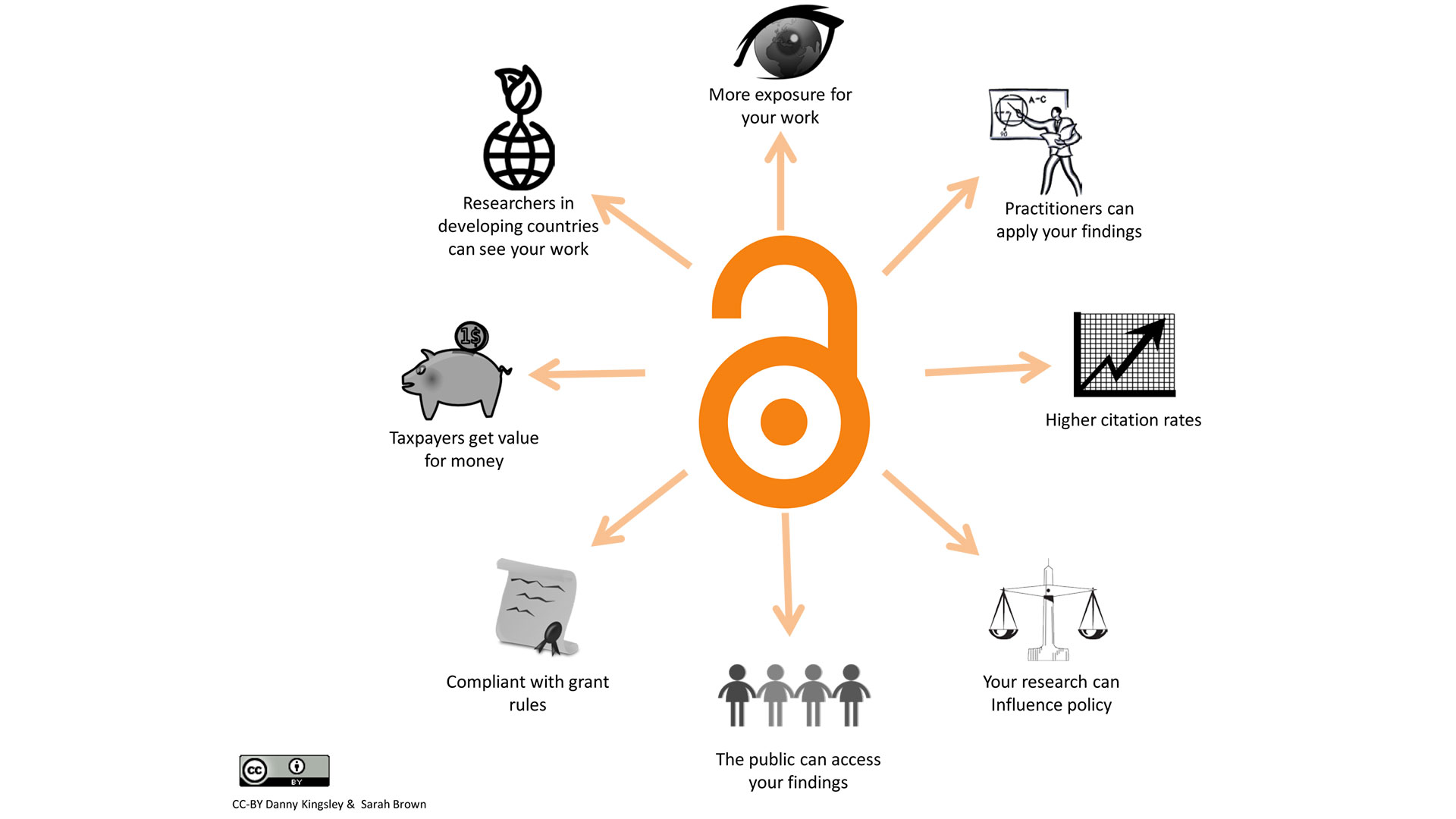Open access

Making your publications open access means your work is read more, cited more and has more impact.
Open access (OA) publications are free to read online and free to reuse (with some restrictions).
For researchers, making research open access means more people can read your research, which in turn could lead to increased citations and collaborations. Stakeholders and potential audiences outside of academia have greater access to research. Smaller institutions and researchers in developing countries can also access research that they would otherwise not be able to afford.
Read our open access and publications policy
Edge Hill University is committed to making its research outputs as widely available as possible and supports the principles of open access.
We updated our open access and publications policy in 2025. From 1st September 2025, authors will be able to retain rights over the author accepted manuscripts (AAM) of research articles and conference proceedings with an ISSN. By retaining rights over their AAMs, the University is able to make the AAM version available via the Edge Hill repository, Pure, or a specific subject repository, with a CC BY licence.
More information about rights retention for Edge Hill authorsCreative Commons licencesHow to publish open access
There are a number of routes to making your article OA.
This route to OA requires no additional payment. If as an Edge Hill author you cannot take advantage of any of the publisher agreements under the Gold route, then the option is to go Green.
To go Green, you need to upload the author accepted manuscript (AAM) to an institutional repository and make it available under a Creative Commons licence. The publisher usually specifies an embargo period before the AAM can be made available. Pure is Edge Hill’s institutional repository, where you can deposit your AAM.
Embargo periods vary depending on the publisher but are typically between 6 and 24 months, depending on the discipline and the journal’s policy. Funders and REF policies are working towards no embargoes at all under Plan S and have updated their policies to reflect this.
Authors can use open policy finder to check the embargo periods and policies of individual journals. Certain publishers like IEEE and Emerald do not have embargo periods and you can put your AAM in Pure on publication if not before.
However as of 1st September 2025, under the new open access and publications policy, authors have the right to make their AAMs available via Edge Hill’s repository, Pure, on or just after publication.
Deposit your AAM in PureMore information about Pure and OA (Edge Hill only)Edge Hill University researchers can take advantage of transitional agreements to publish Gold OA.
This route results in the published article being freely available immediately on publication under a creative commons licence on the publisher’s website. But there is a cost: a fee called an article processing charge (APC).
There are two types of journal that offer Gold OA:
- Fully Gold journals only publish OA papers and therefore you must pay a fee to publish.
- Hybrid journals give you a choice of whether you want to publish via Gold OA or via the subscription model. A fee will be applicable if you choose the Gold OA route.
The University has signed up to transformative agreements with some publishers allowing Edge Hill corresponding authors to publish Gold open access with no APCs. These deals cover original research journal articles, non-commissioned review articles and conference proceedings with an ISSN. But they do not fund data articles, protocols, editorial material, invited reviews, book reviews and commentaries.
Edge Hill University authors, unless they have funds from elsewhere, will only be able to publish via the Gold route by taking advantage of the agreements we have.
We have agreements with the following publishers:
- ACM
- Cambridge University Press
- Elsevier
- Oxford University Press
- PLOS
- Sage Publishing
- Springer Nature
- Taylor & Francis
- Wiley
Remember:
- The corresponding author must have a current affiliation with Edge Hill. If publishing with a former (or soon to be former) student or with colleagues outside Edge Hill, ensure you are the corresponding author.
- Use your staff or student email address when submitting, not a personal one.
- If given the option, we recommend signing up for ‘institutional open access’ when you first submit.
If the journal you wish to publish in is not included in one of our institutional agreements, then you need to investigate an alternative route, either Green or Diamond.
Check if your journal is covered using the SciFree tool. You can find full details of our agreements with publishers on our SharePoint page.
If you still have questions or wish to discuss a particular journal, please contact us.
Full details of our publisher agreements (Edge Hill only)Diamond open access journals are a no-cost model, that is, no cost to the author or the reader. Funding is obtained via other routes. Such journals are community-driven and academic-led.
To find diamond OA journals in your discipline, search The Directory of Open Access Journals (DOAJ). The DOAJ indexes open access journals and only includes those which match their criteria.
Liverpool John Moores University runs an open journal service where you can find many academic-led diamond journals. An example of such a journal is PRISM: Casting New Light on Learning, Theory and Practice whose Editor-in-Chief is Dr David Allan from Edge Hill University.
Open Library of Humanities (OLH) is an open access publisher, which is building a model of open access publishing that functions for the humanities – for free, for everyone, forever. They publish 33 Diamond open access journals showcasing some of the most dynamic research in humanities disciplines. Edge Hill is a paying member of the scheme, which supports this progressive open publishing model.
Institutional repository – Pure
Pure is Edge Hill’s system for recording research carried out by its staff and doctoral students. It is also the University’s institutional repository for research outputs. You can view, share, manage and archive outputs that are open access.
Explore PureMore information about depositing in Pure (Edge Hill only)Open access and REF 2029
The UK Research Excellence Framework (REF) assesses the quality of research in UK Higher Education Institutions and informs the allocation of funding for research. Only research papers meeting specific open access requirements are eligible for submission to the next REF.
Research articles and conference proceedings with an ISSN published open (Gold) on publication with a CC BY licence comply with both the 2021 and 2029 REF open access policies. Edge Hill University corresponding authors can take advantage of our transformative deals to go open on publication, see information on Gold open access above.
The REF 2029 open access policy applies from 1st January 2026. There are stricter requirements on licencing and maximum embargo requirements if publications are not made open on publication. Edge Hill authors are still required to upload their author accepted manuscript to Pure. Edge Hill authors will be able to do this without an embargo due to the new open access and publications policy. More information about rights retention (Edge Hill only).
Longform outputs are not in scope of the policy: monographs, book chapters and edited collections do not need to be open access in order to be submitted to REF 2029. But that is not a reason not to be open. If you wish to explore making such outputs open, please email Judith Carr, Head of Open Research Services.
You can find out more about REF via our SharePoint pages (Edge Hill only).
Open access policies
Applying for external funding?
Check your funder’s policy:
Open access tools
Use these tools when looking for OA articles and journals.
Further support
For more information about OA publishing, please see our FAQs or contact the Open Research Team.